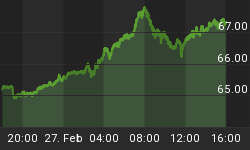Although subprime blowup fears continue to make for enthralling reading, the financial markets have yet to be seriously impacted. Rather, while some repositioning away from financial stocks and into utilities is suggestive of a developing defensive trend in the marketplace, this theme has yet to really get running. For that matter, the tightness in subprime is showing little evidence of spawning widespread restrictive credit practices.
Of course, this could, and likely will, change quickly, and the situation is certainly worth monitoring as we await the ?Greenspan Recession' to start later this year.
"When you get this far away from a recession invariably forces build up for the next recession, and indeed we are beginning to see that sign." Greenspan
As you may recall, Greenspan is the God-like former Fed Chairman that deftly handled any and all financial crisis' with a wave of his magic wand. Having walked-through an unusually tranquil first year, Bernanke could be in need of such a wand later this year, although he may be in for a shock the first time he beckons abracadabra.
Greenspan's Final Rate Cutting Trick vs. Bernanke 2007
With a Federal Funds rate of 6.5%, Greenspan had plenty of ammo to use against the slow down monsters in 2001. On paper Bernanke has almost as much rate cut ammo today. This is where the similarities end.
In 2001, when Greenspan started to aggressively cut interest rates, the price of gold was weak and declining, crude/energy input costs were manageable/predictable, China was just starting to emerge as an emerging-player, and if you uttered the phrase ?commodities super-cycle' you would have been locked up. Suffice to say, the deflationary curse that befell Japan during the 1990s was on Greenspan's mind and inflation was not.
"A rapid and sizable easing was made possible by reasonably well-anchored inflation expectations, which helped to keep underlying inflation at a modest rate, and by the prospect that inflation would remain contained as resource utilization eased and energy prices backed down." Greenspan. July 1, 2001
By contrast, should Bernanke elect to embark upon an easing campaign in 2007, he may have to contend with stubbornly high commodity prices, the first major uptick in currency volatility since his tenure began, and uncompetitive domestic financial markets (and/or increasingly borderless domestic investors). Moreover, Bernanke could be confronted by the most serious threat of all: rising gold. Given gold's sensitively to inflation/money growth, the logical conclusion is that if Bernanke really is itching to pull the trigger to combat the coming Greenspan Recession the price of gold will be pummeled sometime soon. If not, Bernanke will be faced with one of the greatest quandaries since before Volcker - to ease as gold booms?
Check Your Brains At The Door Mr. Bernanke
Theorize as he might about the advantages of targeting inflation, Mr. Bernanke's main job is to be prepared for a financial crisis. To be sure, this is the seat that Greenspan's easy (some would say reckless) money policies left Bernanke, and he has little choice but to sit and wait for his services to be required. Quite frankly, be it a hedge fund collapse, a massive subprime blow-up, or an emerging market meltdown, Bernanke's playbook is to try and restore investor confidence after it is shattered. Period.
Conclusion
If gold loses 50% of its value, crude crashes, and China (EMs) implodes the above speculations all go out the window?and in will fly Mr. Bernanke to aggressively try and chase the subprime (or whatever the major blow-up theme will be) demons away. Thus, the unspoken hope for Bernanke is that while things may turn bad in the US, they will be worse elsewhere. After all, you can't throw a rate cutting party if everyone is dancing in London and Shanghai, and trying to do so could simply add to the list of many reasons of why USD hegemony should be tested further.
In short, it is unlikely that Bernanke will be able to follow the Greenspan script to rate cutting, which should make for an interesting start, not to mention an unpredictable end, to the coming Greenspan recession.















